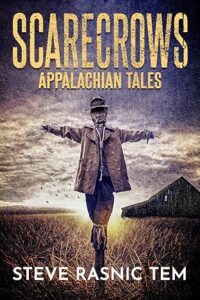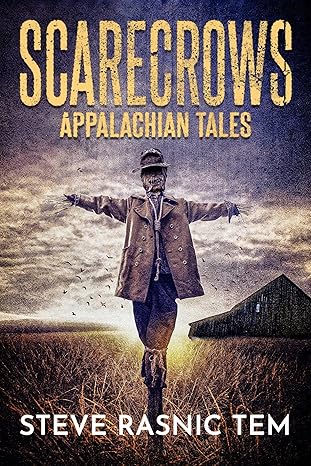Home is where the heart is
Prolific Colorado writer Steve Rasnic Tem visits native ground in these Appalachian tales
Prolific Colorado writer Steve Rasnic Tem visits native ground in these Appalachian tales
Buckle up. Scarecrows :Appalachian Tales defies easy classification. Publishers and purveyors of books like to pick one genre, or perhaps two that are related, and tuck a book neatly into its designated spot, be it romance or mystery or horror.
But Steve Rasnic Tem, author of Scarecrows, defies pigeon-holing. He has written across many genres including science fiction, fantasy, crime, regional fiction and, most notably, horror. His career, spanning more than four decades, includes poetry, plays, short stories and novels. He’s won multiple Bram Stoker awards, plus awards from the International Horror Guild, British Fantasy and World Fantasy.

Steve Rasnic Tem
Rasnic Tem, a long-time resident of Colorado, grew up in the westernmost part of Virginia, in the heart of Appalachia. He returns home in this volume of stories (plus two poems) with love and longing, respect and regret, every flavor of grief and, yes, some horror. Characters are burning for a second chance, and some realize they never got a first one. Throughout the collection, there are about as many flavors of love as the human heart can withstand, from the beautiful and the pure to the warped and well-meaning.
While Scarecrows is designated as horror, the stories go far beyond creating a feeling of fear, excavating an entire emotional landscape. Some of them assault the reader’s heart and wring out emotions they may have forgotten they possessed, not all of them are as simple as “fear.”
One of the recurring motifs in these stories is the idea of returning home. The concept is simple but Rasnic Tem’s execution is as varied in depth and texture as a rag rug made out of every textile that passed through an isolated Appalachian household. In “Smoke in a Bottle,” the main character returns home to close out the house after his mother dies, reviewing and reliving the poor and desperate Christmases of his childhood. In “The Return,” Joel wants to see the place he was born as he gets close to the end of his life, and we’re inside his head as he remembers and forgets the details of his life. “Old Men on Porches” offers a glimmer of hope that not all trips home end badly, even when they’re laden with grief and melancholy. We learn some folks will stand for you because that’s what they do. Mostly they watch, but when they’re needed, they stand.
The stories may be firmly rooted in Appalachia, but the human truths they explore resonate universally. If you’re missing an absent parent, does it matter why they’re gone? The answer to that question takes a dark and unexpected turn in the story “Crawldaddies.” Strained familial relationships get an unusual resolution in “Redbud Winter,” a tale that feels immensely satisfying while breaking your heart. If you’ve ever felt different, outside of the norm and looking at the rest of society like you just don’t get it, you might relate to the narrator of  “Cattiwampus.” This story is more weighted with local dialect than the others in the collection, but Rasnic Tem uses it deftly to put you in the hollers and running through the woods. It reads not as if he created the narrator, but as though he channeled her onto the page, giving her the space to tell her story in her own words.
“Cattiwampus.” This story is more weighted with local dialect than the others in the collection, but Rasnic Tem uses it deftly to put you in the hollers and running through the woods. It reads not as if he created the narrator, but as though he channeled her onto the page, giving her the space to tell her story in her own words.
The grief and longing blended into these stories fairly pours off the pages, dampening and staining your hands like run-off from coal mine creeks. There’s also hope and resolution and redemption. But sometimes the natural ending, to a life or to a story, is a quiet winding down and letting go rather than a bold or brilliant splash. Several stories are leavened with unexpected moments of humor (“Bingo Thompson’s Flying Cat”) and insight (“Almost a Legend” will especially appeal to anyone who loves baseball, grew up rural or worked a soul-grinding manual labor job for the tiny perks it afforded).
The titular “Scarecrows” is a macabre tale that could give O. Henry a run for his money when it comes to unexpected-but-perfectly-developed twists. For a brief but deep look at a hardscrabble family at one particular, crystalline moment in time, “The Bible Salesman” is violent and perfect. Some of that violence takes place in the action of the story, but some of it is glimpsed only in the bruising around the edges. Rasnic Tem often reveals reality in the corner of the reader’s eye as something half glimpsed, moving just ahead or around the corner.
While this collection can go in some dark, damp places, the final two pieces, “A Jack Tale” and “The Return,” culminate with a sense of hope, or at least a lessening of fear about what comes next after this life ends.
MB Partlow (she/her) is a Colorado transplant who has written for the CS Indy, the Gazette, and Pikes Peak Parent, most prolifically in the area of food reviews. She is co-host of the Mysteries, Monsters, & Mayhem podcast, which allows her to indulge her curiosity and her sense of humor, while sharing both with the world. She reads across genres, and generally needs another cup of tea.
Click here for more from MB Partlow.

